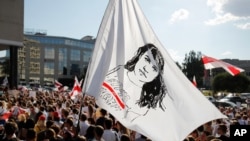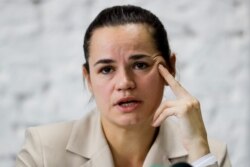Belarusian opposition leader Sviatlana Tsikhanouskaya has told VOA the country’s political crisis is “absolutely an internal affair” as she appeared to reject any idea of imminent Western intervention or help.
Speaking Monday from Vilnius, Lithuania, Tsikhanouskaya said, “The Belarusian people have a responsibility for what’s going on. We think that we have to solve this problem by ourselves.”
“But if it happens that we will need one day the help of other countries, help in organizing this, maybe mediation or negotiation, of course any country that would like to help us with this question is invited,” she added.
Tens of thousands of people have taken to the streets of Belarusian cities in recent weeks to demand the resignation of President Alexander Lukashenko, who refuses to step down. Lukashenko claimed victory in elections August 9. Opposition parties, along with the United States and the European Union, say the poll was heavily rigged.
More than 7,000 protesters have been arrested, and widespread evidence of abuse and torture has been reported. At least four people were reported to have died during the demonstrations.
Now Tsikhanouskaya is trying to coordinate a roadmap for Belarus’ future from her new base in Vilnius.
“First of all, we’ll start negotiations, when [authorities] release all political prisoners, who are innocent and still in Belarusian jails,” she told VOA. “We are fighting for free, fair and transparent elections, which means that every citizen of Belarus will be able to participate in those elections. A more pertinent question would be whether Mr. Lukashenko has the moral right to participate in the new elections after all those crimes he committed.”
Tsikhanouskaya was briefly detained and fled to neighboring Lithuania following the election, fearing for her and her family’s safety. She refused to elaborate further on why she left Belarus.
“I had big reasons to make this step. I can’t talk about this now. Maybe some [time] in the future I will talk all about my story, but now I can’t comment on it.”
Tsikhanouskaya ran for the presidency after her husband, Sergei Tsikhanousky, a prominent YouTube blogger, was arrested in May and barred from taking part in the election. Several other opposition figures also were arrested, and their wives joined the political opposition movement.
Tsikhanouskaya praised the hundreds of women who have taken part in the protests in recent days, many wearing white and red, the traditional colors that have become emblematic of the political opposition to Lukashenko’s rule.
“It’s difficult for me, because I want to be with them,” Tsikhanouskaya said. “And you know why? Because I do not fully feel that atmosphere. Observing it from here, it looks scary to me and they seem afraid, but people who are there tell me that they are inspired.”
“We don’t want our women to be snatched off the streets. I hope that [the riot police] are not going to lower themselves to that level. But we are such a force. We, the women of Belarus, are such a force. I am worried about them, but they are so strong,” she added.
The Kremlin has invited President Lukashenko to Moscow in coming days. Russian President Vladimir Putin said last week he has a police reserve force ready to intervene in Belarus.
“Mr. Putin has to understand that if he does something against us Belarusians, it will seriously damage the relationship between the Russian and Belarusian people,” Tsikhanouskaya said. “And because we are allied nations, we are considered almost brothers, it is not in the interest of either Belarus or Russia.”
WATCH: Behind Russia’s Take on Mass Protests in Belarus
Many outside observers have compared the crisis in Belarus to the revolution in Ukraine in 2014, when Russia invaded the country following the overthrow of President Viktor Yanukovych. That revolution was marked by the presence of European Union flags among the anti-government protesters, and opposition calls for U.S. and other Western help.
Tsikhanouskaya’s explicit rejection of outside support for Belarus’ opposition stands in contrast to events in Ukraine. Her role in any future government, and the fate of the growing protest movement, remain highly uncertain.









